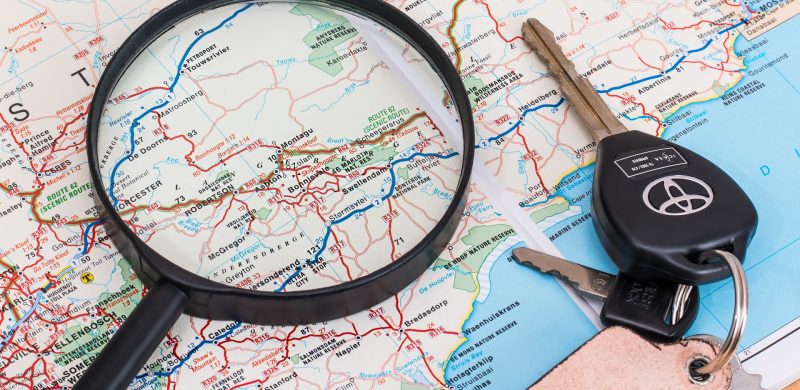
Have you ever been frustrated after your GPS sat-nav mapping function automatically disengages as you reach your destination? Or it misses your intended address by a whole block? Not anymore.
what3words is a global grid of 57 trillion 3mx3m squares. Each square has a 3 word address that can be communicated quickly, easily and with no ambiguity. Using words means non-technical people can accurately find any location and communicate it more quickly, more easily and with less ambiguity than any other system like street addresses, postcodes, latitude & longitude or mobile short-links. More information can be found at what3words.com.
What3words (w3w) has a surprisingly simple and efficient way to find an address and get you there. The London startup has divided the world into a grid pattern of 57 trillion 3m x 3m squares and given each one a unique 3-word address. It means anyone can accurately find any location and share it instantly, removing the ambiguity from the search process.
At the Frankfurt Motor Show, Mercedes Benz announced it would be integrating this radical new address system into a selection of its models from 2018. “The United Nations and the Red Cross use us in disaster zones, and now Mercedes has realized that there is a problem in the developed world with accurate mapping systems and they have employed our software,” says Giles Rhys Jones, w3w’s chief marketing officer.
“You will still get the same traditional sat-nav system that Mercedes uses. It’s just that now, you will have a choice of using the w3w system, which just lays over the top of existing systems, giving you its signature 3m x 3m grid pattern,” adds Rhys Jones.
Just say your 3 words to the voice activated system and within a few seconds you have a destination the size of a car parking bay.
The system will accept both voice recognition and typed in requests. In fact, it is the world’s first in-car 3-word address voice navigation system. You just say three words one after the other and the system automatically comprehends the commands, and writes them with dots in between the words.
So for example, search for the Metropolitan Museum of Art in New York City and the 3-word address is cage.rocks.gladiators. Whereas an address with one letter different or added like cages.rocks.gladiators is located in California over 2,700 miles away. Meanwhile, said quickly to the voice recognition software, it might misunderstand your museum request and offer you cage.rock.gladiators, which turns out to be in the U.K. The user instantly knows which address to choose just by looking at the location.
“This system is set up so that similar sounding addresses are far apart and cannot get confused with your intended destination. It has an error detection and auto-suggest built in to help it differentiate words. They also recorded lots of people saying words in different accents around the world to help train and tune the system,” says company CCO, Clare Jones.
“It is really starting to catch on as people realize its effectiveness. We are being used for such functions as postal services in Mongolia and Nigeria. Every bus stop in Nigeria has a 3-word address. We are employed by the Glastonbury Music Festival for first-aid emergency response, because w3w can pinpoint a patient in a huge crowd. And the international delivery service Aramex has started using us across Africa and the Middle East because many addresses are so vague,” comments Rhys Jones. With all that success, no wonder Mercedes took them up.
The story behind w3w has the makings of a great sci-fi mystery novel. A talented musician frustrated with ambiguous addresses enlists the help of two mathematicians and together they stumble onto a new potentially global standard for mapping systems that could save lives.
Company cofounder and musician Chris Sheldrick identified the need for a better, more efficient addressing system after bands and musical equipment kept getting lost en route between gig locations due to vague addresses. In 2013, Sheldrick sat down with mathematician friends Jack Waley-Cohen and Mohan Ganesalingam, and started brainstorming about how to create a more usable and reliable address system. After realizing that even watered-down versions of 18-digit GPS coordinates were too complicated for most people to remember, they came up with the idea of a 3-word combination, devised a core algorithm, built their first wordlist and created an app.
So why did these three pioneers decide on 57 trillion squares? Firstly, to divide the whole planet up into a 3×3 meter grid pattern, they needed 57 trillion squares. To be able to uniquely name these squares with 3-word phrases, they simply came up with 40,000 words and cubed it to get 64 trillion-word combinations, a little more than the 57 trillion necessary.
Now that Mercedes Benz has integrated w3w into their sat-nav system, other carmakers are knocking on their doors says Jones. “Yes, we are going to Japan soon for further discussions with carmakers over there,” says Jones. “And next year we will move into China, Japan and Korea, but with a system devised in their own languages.”
Obviously, the team already covers the globe with their English 3-word phrases, but will be creating versions in the local languages as they have in Mongolia and several other countries. “The challenging part is to find all the words that cannot be used, words that have double meanings and swear words. We need to delete them from the creative process. We also focus on different accents too.”
The company has just 15 employees but plans to boost that number to around 30 people by the end of the year, as the system does not need much maintenance.
“Countries and carmakers are learning that by using us, they can dramatically improve their customer experience, improve their costs, and can save lives,” says Jones. “We are on a mission to become a global standard. And I think we’re well on the way.”
What3words provides billions of people with an accurate, easy-to-find address. However, they will not be able to use them for legal purposes like starting bank accounts, not until w3w is recognized by local authorities. And using what3words, no Mercedes Benz driver will ever get lost again.
It also launched a secondary layer on top of these word trios as its monetisation play. Specifically, it’s selling the ability to brand a location with a word or character string of your choice. This must be between six and 31 characters, and can include letters, numbers and hyphens — thereby giving brands and retailers the opportunity to buy their brand name. OneWords cost £0.99/$1.50 per year. It says it’s managed to sell more than 10,000 OneWords already.
Buyers of OneWords include businesses wanting to be found via a simple keyword search of the map, for example, but it’s also open to individuals to buy in to. “Early buyers include a mix of businesses buying OneWords for their locations, individuals buying OneWords for personal locations and some opportunistic purchasing of interesting words,” CEO Chris Sheldrick told TechCrunch.
“Our goal is to be for everyone. The need to communicate accurate locations is almost a universal one, so a way to do this better is something that could be used by everyone.”
The OneWord option doesn’t have to be literally a single word — although it can be, such as ‘bicycle’ (above, right) for instance — but can be whatever propriety string the buyer fancies (assuming someone else hasn’t bought it already). Other examples that have apparently already been purchased include ‘johnoffice’ and ‘football’.
what3words’ standard three-word location stamps, which are automatically assigned to all global locations, are far more poetic, if less memorable. Sheldrick says its algorithm typically assigns shorter, easier-to-remember word combinations to more densely populated areas. And vice versa.
Why do people in locations like the U.K. and the U.S. need word-tagged locations when they have GPS on their smartphones and the ability to share a map link or image via SMS or email? That kind of sharing doesn’t work verbally for one thing, says Sheldrick. He also argues that current methods of location sharing are too complex — and are therefore ripe for disruption.
“People just don’t call each other up or email them GPS coordinates, but we think they will do it with something more user-friendly like three words or a OneWord,” he says. “In terms of pinning locations on digital maps — it is very challenging to do this on existing platforms without actually being at the location. Google Maps, for instance, doesn’t make it easy to share a location in the middle of, say, Central Park or Hyde Park to organise a meeting point. Extend this into places like Australia or Africa or rural USA with vast open swathes where people live, and work and it becomes more than just a fun tool.”
Asked whether what3words sees the service being especially useful in areas where GPS-enabled smartphones might not be so prevalent, Sheldrick adds: “We see our service being most useful where current methods of describing location (e.g. postcodes or ZIP codes) don’t do the job well enough or don’t do the job at all — but of course it has applications as a preferred alternative even where the existing solutions do a decent job, but perhaps less precise/customised than w3w.”
A key question for what3words is adoption. It’s going to need to get enough people using its map to make its postcode-replacement word trios stick. To that end, it’s lining up an API — which it says will be released “in the coming weeks” — that will allow businesses to integrate what3words into their current IT infrastructures. “Taxi firms, for instance, have already spotted the potential efficiency benefits of enabling customers to use what3words,” it says.
Sheldrick also says it sees the API as a potential source of revenue. “For example, we’re talking to an organisation that works with the emergency services in Australia and they want to be able to receive the location of an incident as 3 words, and integrate that information into their current systems. We are also in talks with a firm in the Middle East — where address systems are notoriously bad, and where online deliveries can take up to 30 days — to hook into w3w to make the delivery side of e-commerce much more functional.”
“Ultimately, we feel that the API integration opportunities will be the most powerful use of the what3words technology — but for this to happen, we feel that it’s essential for our users (and possible API partners) to become familiar with the site and app as standalone entities first,” he adds.
Meanwhile, flogging 10,000+ words isn’t bad going for one week of operation. Although it remains to be seen whether what3words can keep this momentum going after the noise of its launch dies down.




